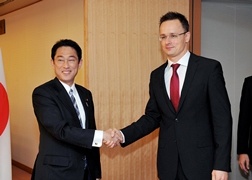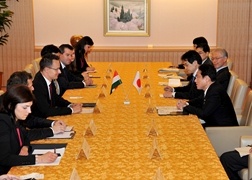[Ministry of Foreign Affairs] [Tuesday, Nov 4, 2014]
Dispatch of a female Self-Defense Force personnel to NATO headquarters
1. Lieutenant Colonel Chizu KURITA, from the Japan Ground Self-Defense Force, will be sent to NATO Headquarters as the adviser to NATO Special Representative for Women, Peace and Security in the office of the Secretary General from December 1, 2014 for approximately two years.
2. In the meeting between Prime Minister Shinzo Abe and the Secretary General last May during the visit of Prime Minister to NATO HQs, it was decided that the government of Japan would send a Japanese female government personnel. Based on this decision, the dispatch of Lt. Col. KURITA to NATO HQs was arranged through necessary coordination between the government of Japan and NATO.This dispatch is in line with the Individual Partnership and Cooperation Programme (IPCP) between Japan and NATO that was signed by Prime Minister Abe during his visit to NATO HQs. The IPCP upholds the promotion of Japan-NATO cooperation in the area of women, peace and security.
3. Lt. Col. KURITA will give advice on integrating a gender perspective into various policies and activities of NATO and promoting the active role of women based on the United Nations Security Council Resolution 1325 on women, peace and security, as well as engage in other relevant tasks.
4. Japan and NATO are “reliable natural partners” that share fundamental values and are corroborated by concrete actions. The dispatch of a female Self-Defense Force personnel to NATO HQs is expected to further enhance such cooperative relationship between Japan and NATO.
NATO (North Atlantic Treaty Organization)
NATO is responsible for three core tasks of collective defense, crisis management, and cooperative security. The principle responsibility is to defend territories and people of its members. NATO has 28 members.
IPCP (Individual Partnership and Cooperation Programme)
IPCP is a document serving as guiding principles for Japan-NATO cooperation and was signed and announced by Prime Minister Shinzo Abe and NATO Secretary General Anders Fogh Rasmussen during PM’s visit to NATO Headquarters on May 6, 2014. The IPCP will help advance cooperation in a broad range of fields from global commons such as the seas and cyberspace to disaster relief, women, peace and security, and defense exchanges.
Missions of NATO Secretary General’s Special Representative for Women, Peace and Security
NATO Secretary General’s Special Representative for Women, Peace and Security takes a leadership in raising awareness of NATO’s policies and activities in the area of Women, Peace and Security, and ensuring their coordination, and cooperating with the United Nations and other relevant organisations. Ms. Skåre, a Norwegian diplomat, who had been in the job until the end of September 2014, attended the World Assembly for Women Tokyo 2014 (WAW! Tokyo 2014) held in the middle of September to share NATO’s efforts in the area of women, peace and security. As her successor, Ambassador Schuurman, a Dutch diplomat, has just assumed the post on October 24.
[Minstry of Foreign Affairs] [Saturday, Nov 1, 2014]
Congratulatory Message from Prime Minister Shinzo Abe to H.E.Mr. Jean-Claude Junker (Appointment of new President of the European Commission)
1. On November 1, Prime Minister Shinzo Abe sent President of the European Commission, H.E.Mr. Jean-Claude Junker a congratulatory message on his appointment as the new President of the European Commission.
2. In the message, Prime Minister Abe stated that Japan and the European Union are global partners sharing fundamental values and principles and that Japan intends to continue to engage in further strengthening its cooperative relationship with the EU in a wide range of fields, including the Japan-EU Economic Partnership Agreement and Japan-EU Strategic Partnership Agreement.
[Ministry of Foreign Affairs] [Wednesday, Nov 5, 2014]
Japan-Hungary Foreign Ministers’ Meeting
On November 5, commencing at 3:55 p.m. for approximately 30 minutes, Mr. Fumio Kishida, Minister for Foreign Affairs, held a meeting with H.E. Mr. Péter Szijjártó, Minister of Foreign Affairs and Trade of Hungary, in Tokyo. An overview of the meeting is as follows:
1. At the beginning, Minister Kishida congratulated Minister Szijjártó on his appointment as the Minister of Foreign Affairs and Trade. At the same time, Minister Kishida once again confirmed that Japan and Hungary are united by universal values such as democracy and rule of law and stated that it was pleasant that cooperation in a wide range of fields were progressing within a framework of “V4 + Japan.”
Minister Szijjártó stated that the Japan-Hungary relationship occupies an important part of Hungary’s diplomatic strategy. He said that Japan is an important partner for Hungary not only in bilateral relations but also in an international community, and he also expressed his willingness to strengthen the framework of “V4 + Japan.”
2. Japan-Hungary relationship
Touching upon the fact that Hungary has been strongly progressing its economic diplomacy, Minister Kishida requested the continuing and active support for more than 140 Japanese enterprises that have already advanced into Hungary. In response to this, Minister Szijjártó stated that the Government of Hungary would be committed to provide its full support of the activities by the Japanese enterprises.
The two ministers shared the view that they will accelerate negotiations for an early introduction of the Japan-Hungary working holiday scheme. Moreover, while Minister Kishida expressed his willingness to cooperate for the acceleration of negotiations aiming at an agreement in principle on the Japan-EU economic partnership agreement (EPA) within the year 2015, Minister Szijjártó stated that he will support an early conclusion of the Japan-EU EPA.
3. Regional and international situations
The two ministers exchanged opinions on the situation in Ukraine, situation in East Asia, and on the United Nations Security Council reform.


[Ministry of Foreign Affairs] [Friday, Nov 7, 2014]
Opinion Poll: 2014 U.S. Image of Japan
The Ministry of Foreign Affairs contracted with Nielsen Consumer Insights Inc. to conduct an opinion poll by Harris Poll on the image of Japan in the United States from July 31 to August 21, 2014. This poll is the latest in a series of similar opinion polls conducted almost every year since 1960. For the “general public” group, telephone interviews were carried out with 1,003 adults aged 18 and over who live in the United States. For the “opinion leaders” group, telephone interviews were carried out with 200 people in leading positions in the fields of government, business, academia, the news media, religion and labor unions. (The margin of sampling error is plus or minus 3% for the “general public” group and plus or minus 7% for the “opinion leaders” group, at a 95% level of confidence).
1. The percentage who perceived Japan to be a dependable partner was 73% (vs. 76% in 2013) among the general public and was 90% (vs. 93% in 2013) among opinion leaders, high figures similar to the last year’s poll. The 67% (vs. 58% in 2013) of the general public and the 70% (vs. 86% in 2013) of the opinion leaders viewed cooperation between Japan and the U.S. as “excellent” or “good”. In addition, the percentage of those who agreed that the Japanese and American people had a good or fair understanding of each other was 35% (vs. 37% in 2013) among the general public, and 32% (vs. 39% in 2013) among the opinion leaders.
2. As for which country is the most important partner of the U.S. in Asia, the percentage of the general public that chose Japan as the most important partner was 46% (vs. 35% in 2013) in the first place followed by those who chose China which was 26% (vs. 39% in 2013). Among opinion leaders, Japan was the first place with 58% (vs. 39% in 2013) and China came in the second place with 24% (vs. 43% in 2013). Japan has reappeared in the first place as the most important partner of the U.S. among both general public as well as opinion leaders this year since the time when it was the case last in 2009.
3. With regard to the Japan-U.S. Security Treaty, the percentage who answered that the U.S. should maintain the current Japan-U.S. Security Treat was 81% (vs. 67% in 2013) among the general public and 85% (vs. 77% in 2013) among the opinion leaders. The survey result this year indicates greater support to the Treaty compared to last year. As for the percentage of those who answered that the Treaty contributes to the peace and security of Japan and in the Far East either to “a great extent” or to “a moderate amount” was 77% (vs. 81% in 2013) among the general public and 89% (vs. 87% in 2013) among the opinion leaders. The percentage of those who answered that the Treaty is “very important” or “somewhat important” for the U.S. in terms of its own security was 83% (vs. 88% in 2013) among the general public and 88% (vs. 88% in 2013) among the opinion leaders. Therefore, the Japan-U.S. Security Treaty system is highly evaluated overall. With regard to whether or not Japan should increase its self-defense capability, 57% (vs. 64% in 2013) of the general public answered “Yes, should increase”, while for the opinion leaders the figure was 65% (vs. 72% in 2013).
4. The answers towards newly set question to ask if Japan and the U.S. should closely cooperate for peace and security in the Asia-Pacific region illustrate 91% positive among the general public and 97% also the case for among the opinion leaders. The result for another newly launched question to examine if Japan should play a more proactive role for peace and security in the Asia-Pacific region also shows that the majority of the audience with 81% among the general public and 88% among the opinion leaders responded that Japan should play a more proactive role.
5. With regard to the image describing Japan (multiple answers allowed; targeting the general public only), Japan was viewed as “a country that has great tradition and culture” (92%); “a country with a strong economy and high-technology” (86%); “a country that has consistently been a peace-loving nation since the end of World War II” (81%); and “a country with beautiful nature” (81%). With respect to the areas that the public are interested in regarding Japanese culture, “Japanese food” (68%); “Sumo or Japanese martial arts such as Karate, Judo, or Kendo” (51%); and “Flower arrangement” (48%) were among the most selected answers.
6. Concerning what policy Japan should focus on in order to deepen economic ties between Japan and the U.S. (survey targeted only the opinion leaders), 91% responded that Japan should “promote technological cooperation in areas such as clean energy and high-speed railway systems,” followed by 88% positive towards Japan should “cooperate in negotiation of the Trans-Pacific Partnership,” and then by 61% towards cooperation to “develop natural resources such as shale gas.”
*The previous opinion poll was conducted by Harris Poll under the contract with Harris Interactive Inc. between July 26 and August 23, 2013. Harris Poll is now under Nielsen Consumer Insights Inc. which acquired Harris Interactive Inc.